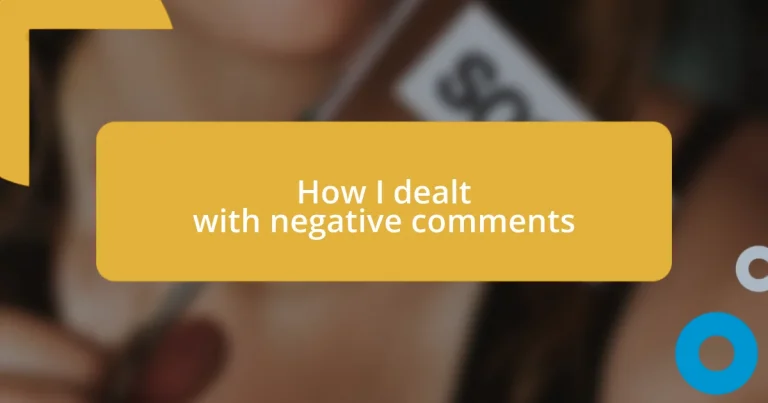Key takeaways:
- Negative comments can provoke strong emotional reactions and impact self-perception, but recognizing their origin can help minimize their effect.
- Engaging with criticism through curiosity and seeking clarification can transform negativity into opportunities for growth and learning.
- Maintaining a positive mindset involves intentional reflection, celebrating small victories, and viewing feedback as a constructive tool for improvement.
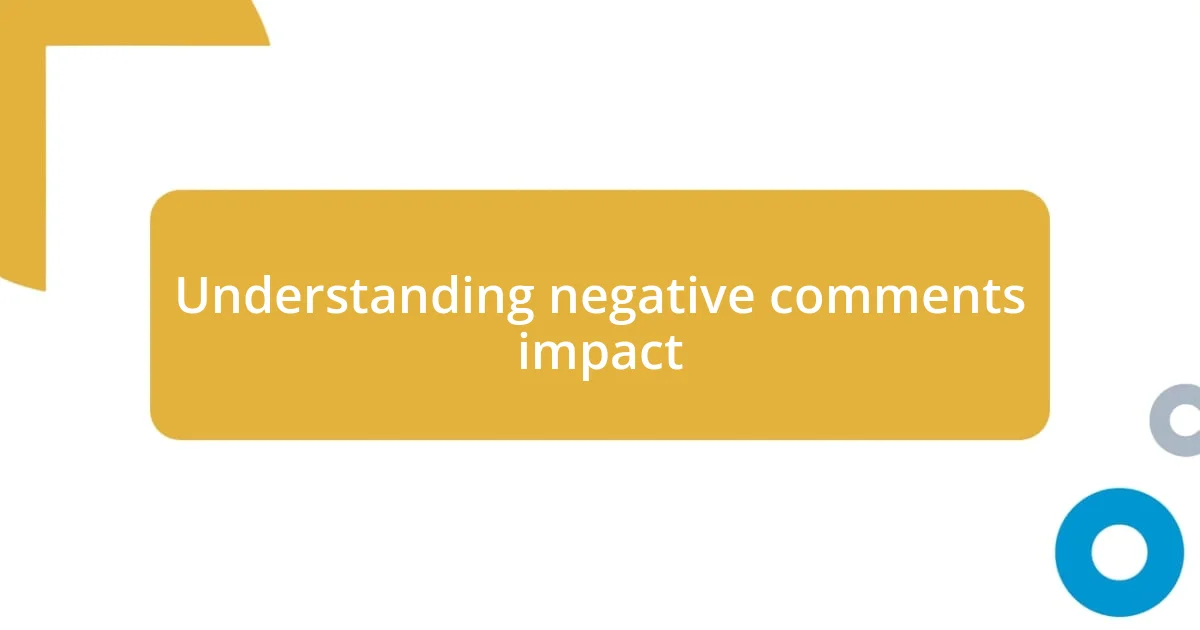
Understanding negative comments impact
Negative comments can feel like a personal attack, whether they come from peers or strangers. I remember a time when a critical review of my work left me feeling deflated, questioning my abilities. It’s astonishing how one negative remark can overshadow a dozen positive ones—what is it about negativity that captures our attention so fiercely?
Emotionally, negative comments can trigger a whirlwind of feelings, from self-doubt to anger. I once found myself replaying a harsh comment in my mind for days, wondering if I really was as incompetent as the person suggested. Have you ever felt the weight of someone’s words pull you down? It’s crucial to recognize that these remarks often reflect the speaker’s state of mind more than they do your worth.
The impact of negative feedback extends beyond the initial sting; it can shape our actions and self-perception. In my experience, I’ve seen how embracing constructive criticism helps me grow, but I also learned to set boundaries with unwarranted negativity. How do you safeguard your self-esteem when navigating this tricky terrain? It’s all about developing a resilience that allows you to sift through the noise and focus on what truly matters.
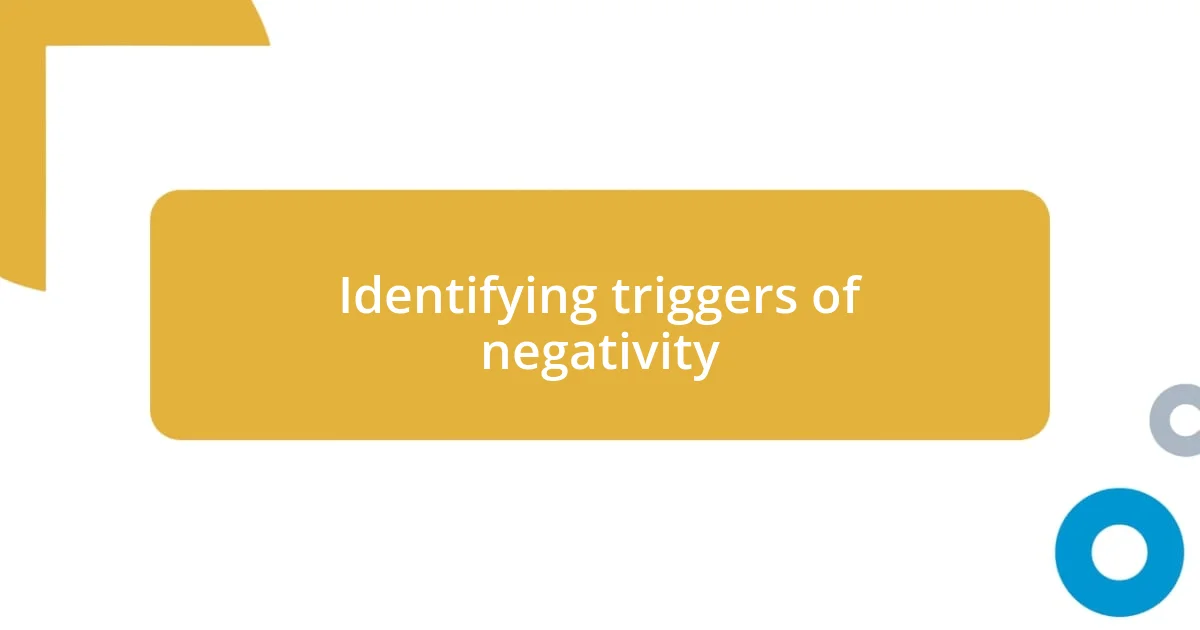
Identifying triggers of negativity
Identifying the triggers of negativity requires self-reflection and awareness of our emotional responses. I’ve noticed that certain environments, like high-pressure work settings, often amplify negativity. For instance, during a particularly hectic project, I was sensitive to every critical feedback, making me realize that my stress level was a significant trigger for how I received comments.
Moreover, the source of negativity plays a crucial role in how we react. When criticism comes from someone I respect or care about, it stings more deeply. I once had a mentor whose harsh words, meant to guide me, left me feeling insecure rather than inspired. Recognizing that not all criticism is delivered with bad intentions can help ease the emotional weight.
It’s fascinating to note how our past experiences shape our responses to negativity. I recall a time in my youth when I was frequently ridiculed for sharing my opinions. That background made me particularly defensive in situations where I might face criticism, even if it was constructive. Understanding these triggers has been a vital step in minimizing their impact on my self-esteem.
| Trigger | Emotional Response |
|---|---|
| High-pressure environments | Increased sensitivity to criticism |
| Negative feedback from respected sources | Heightened insecurities |
| Past ridicule experiences | Defensiveness even in constructive criticism |
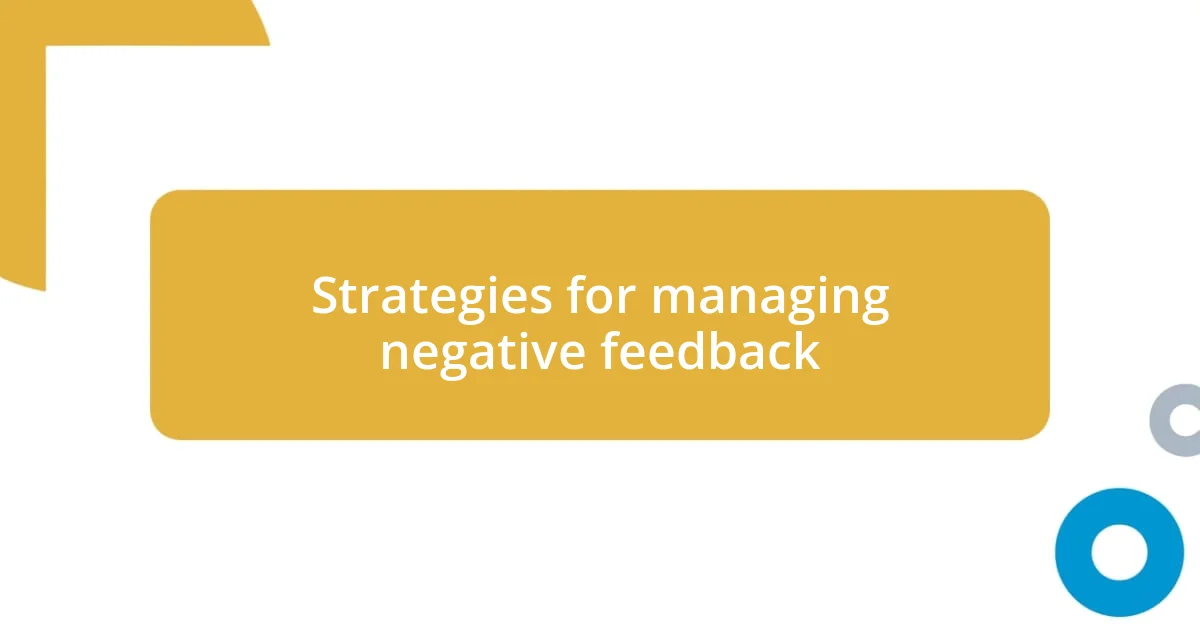
Strategies for managing negative feedback
When managing negative feedback, I’ve found that it helps to approach it with a curious mindset. Instead of feeling attacked, I try to see if there’s any truth in the comment. One time, I received a critique about my presentation skills. Initially, I felt defensive, but then I asked the person for more details. This led to a productive conversation that improved my skills and transformed my frustration into a learning opportunity.
Here are some strategies I recommend for managing negative feedback:
- Pause and Reflect: Take a moment to breathe. Emotions can cloud judgment, so stepping back allows for a clearer perspective.
- Seek Clarification: If a comment stings, don’t hesitate to ask for specific examples. It not only helps you understand better but can also diffuse any immediate tension.
- Focus on Growth: I often remind myself that growth comes from discomfort. Embracing feedback as a catalyst for improvement can shift my mindset from negativity to motivation.
- Limit Exposure: Sometimes, the source of negativity can be chronic. I’ve learned to set boundaries with individuals who consistently bring me down while still keeping the door open for constructive voices.
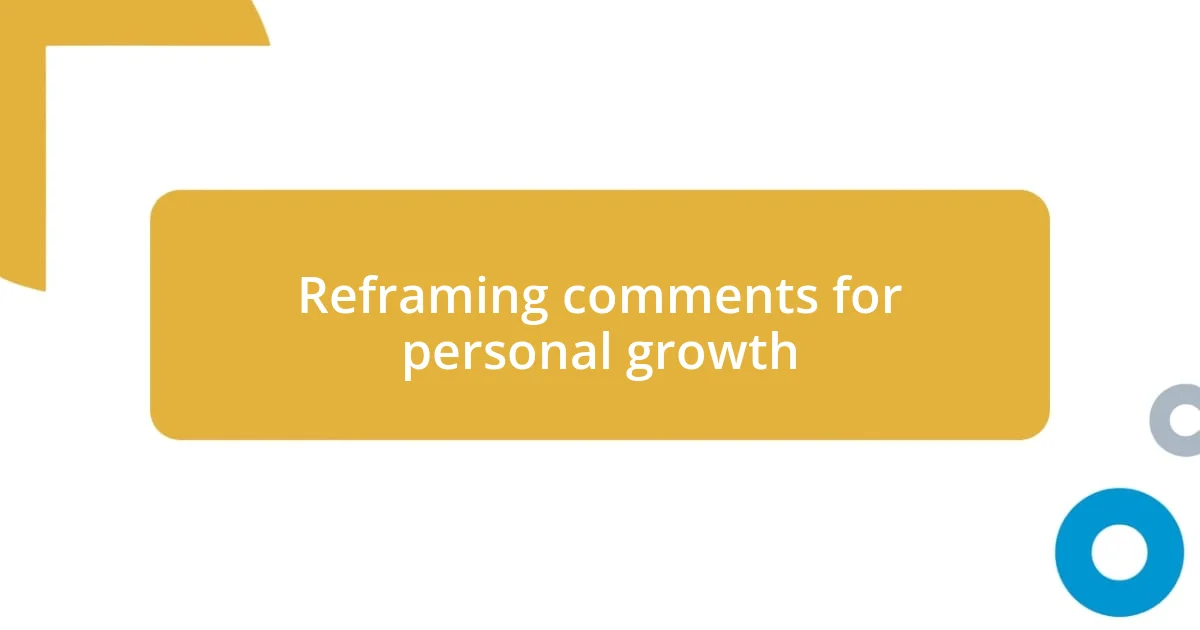
Reframing comments for personal growth
Reframing negative comments can transform how we perceive them and ultimately contribute to our personal growth. For instance, when a colleague once criticized my ability to delegate tasks, I felt a knot in my stomach. But instead of wallowing in self-doubt, I asked myself, “What if this feedback reveals an opportunity to become a better leader?” This mindset shift helped me embrace the feedback and work on loosening my grip on control, which was beneficial for my team and my own development.
I remember a time when my writing was heavily criticized in a workshop. Initially, it felt like a punch to the gut, but then I considered the perspectives offered. Was there any honesty in their criticism? By actively engaging with their comments, I discovered nuances in my writing style I hadn’t noticed before. It turned out, that feedback wasn’t just criticism; it was a roadmap toward becoming a more effective communicator. How often do we miss out on valuable insights because we’re too quick to take offense?
Moreover, I often reflect on the idea that growth frequently happens in uncomfortable spaces. I once had a friend who always pointed out my flaws during tough conversations. At first, it felt like an attack, but over time, I realized she genuinely wanted me to improve. Recognizing her intent allowed me to reframe those moments as chances to grow, turning what felt like negativity into fuel for personal evolution. Isn’t it interesting how shifting our perspective on criticism can open up new avenues for self-discovery?
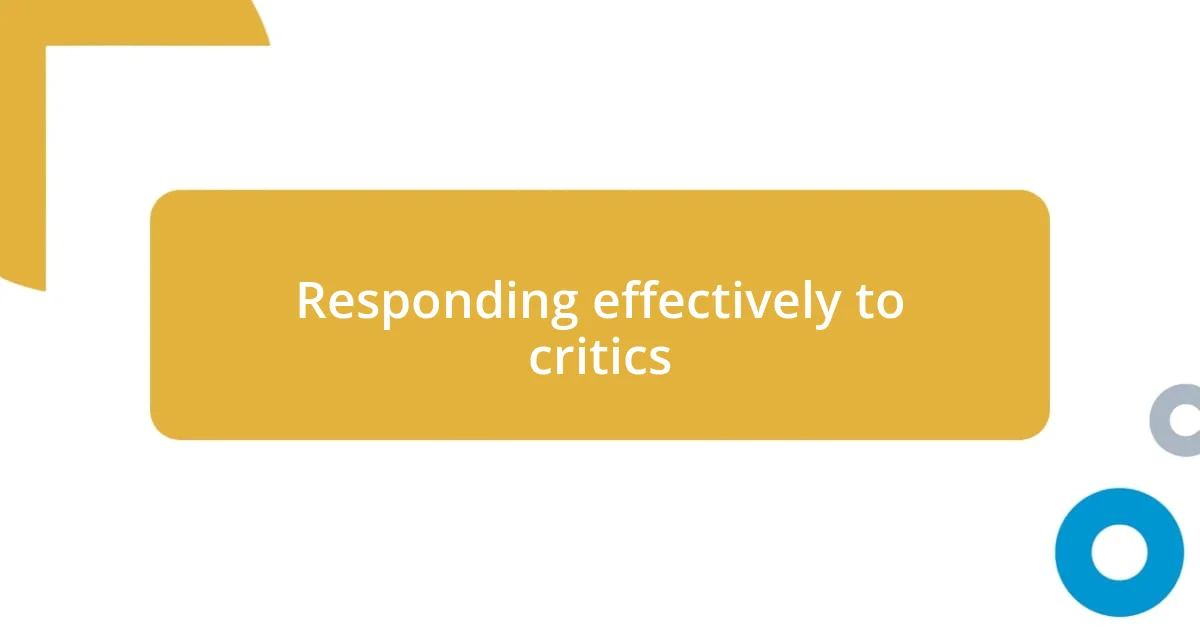
Responding effectively to critics
Responding to critics can feel daunting, but I’ve learned that it’s all about intention and clarity. I remember when I faced a barrage of negative comments after a project launch. Instead of lashing out in retaliation or simply ignoring the feedback, I took a deep breath and reached out to some of the critics for a dialogue. This approach transformed a potentially bitter encounter into an opportunity for valuable insights. Have you ever thought about how openly engaging with your critics can turn adversaries into allies?
It’s crucial to tailor your response to the nature of the criticism. I had a colleague who often critiqued my strategic decisions. Initially, I felt that her feedback was more about personal preference than constructive analysis. However, I later approached her from a place of curiosity, asking her to explain her viewpoint. This opened a door to meaningful discussions, allowing me to integrate her insights without compromising my own vision. It’s remarkable how a simple shift from defensiveness to curiosity can foster collaboration instead of conflict.
I’ve found that another effective strategy is to express gratitude, even for negative comments. One time, I received harsh feedback on a report I’d submitted, and my first instinct was to feel hurt. But after taking some time to reflect, I thanked the reviewer for their honesty. This small gesture not only eased my emotional burden but also encouraged an open dialogue about how I could improve in future submissions. Isn’t it intriguing how embracing a positive attitude towards critique can create a more supportive atmosphere for growth?
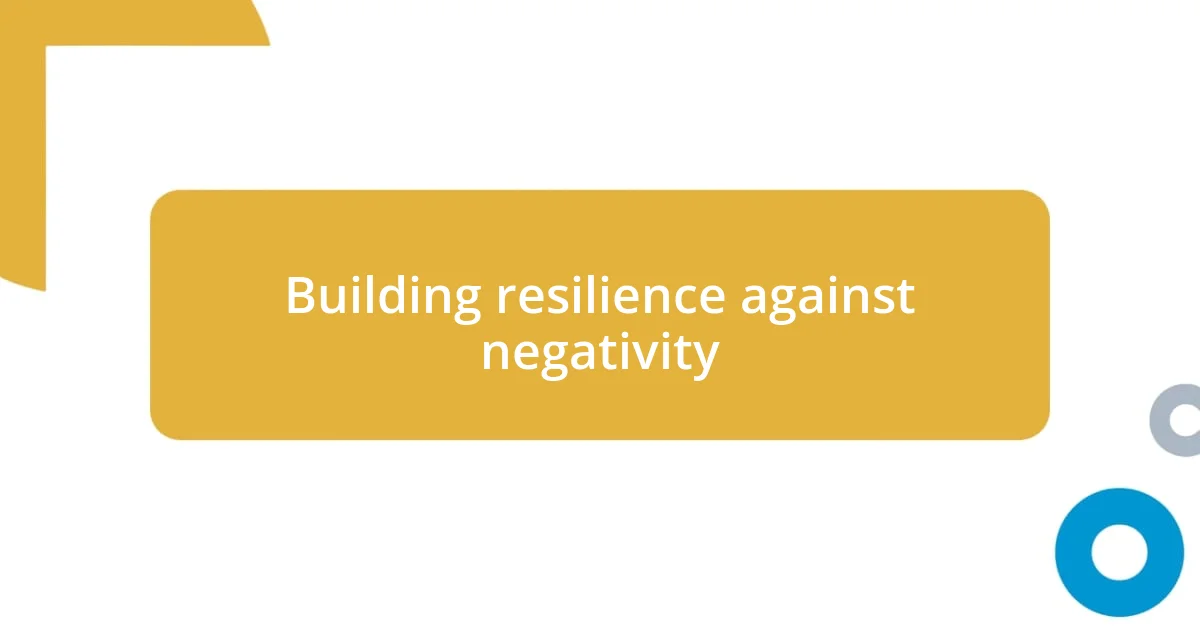
Building resilience against negativity
Building resilience against negativity is a journey that often requires personal exploration. When I received harsh comments about a presentation I had poured my heart into, I felt a familiar wave of frustration wash over me. Instead of succumbing to those feelings, I reminded myself that resilience isn’t about avoiding criticism but rather about using it as a foundation for strengthening my confidence. Have you ever found that facing negativity head-on has made you more robust in the long run?
As I navigated through these experiences, I realized that surrounding myself with supportive people helped counterbalance the negativity. One of my closest friends often shared her own experiences with criticism, and those conversations became valuable lessons. Listening to her stories and how she responded to setbacks offered me different perspectives, showing me that resilience is often collective rather than solitary. Isn’t it powerful how shared experiences can help us grow stronger together?
Journaling has also played a critical role in my resilience-building process. After facing a particularly tough week filled with negative feedback, I spent time writing down my thoughts. By articulating my feelings, I could separate my emotions from the criticism itself. This reflective practice allowed me to see each piece of negative feedback as just a small part of my larger journey rather than my entire identity. Doesn’t writing about our experiences offer a unique lens through which we can view our growth?
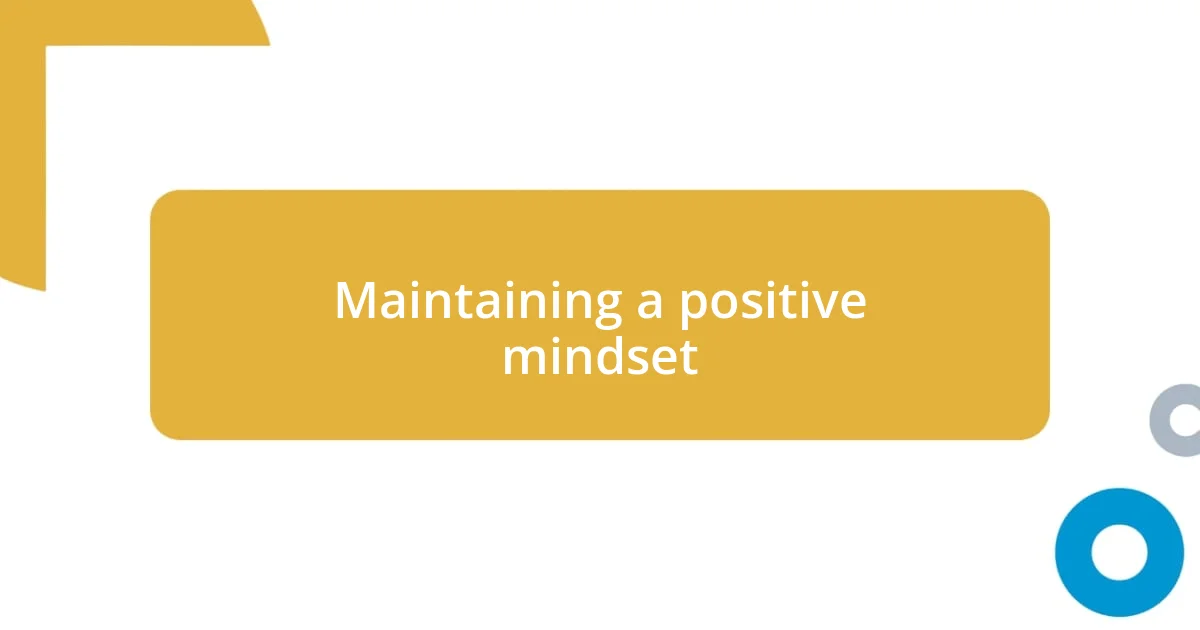
Maintaining a positive mindset
Maintaining a positive mindset takes intentional effort, especially in the face of negativity. I recall a time when I received a particularly scathing review on a project I had invested countless hours in. Instead of letting the sting of the comments weigh me down, I decided to focus on the aspects that resonated with me. I thought about what I could learn from the review and how I could apply those takeaways moving forward. Isn’t it amazing how reframing our thinking can shift our entire emotional landscape?
Finding joy in the process can also fuel a positive mindset. One of my favorite strategies is to celebrate small victories, even in challenging circumstances. After a tough round of feedback, I would take a moment to reflect on what went well and recognize the effort I put into the work. This habit not only lifted my spirits but also reminded me that every project has its worthwhile points. Have you ever noticed how acknowledging your achievements, no matter how small, can spark motivation?
Lastly, developing a mantra can be incredibly beneficial. When I faced a setback, I often repeated to myself, “Feedback is a gift.” This simple phrase helped me view criticism not as an attack but as a chance to grow. In those moments of doubt, I would remind myself that each piece of feedback could guide me to better my skills and refine my ideas. Isn’t it fascinating how a shift in perspective can turn obstacles into opportunities?












